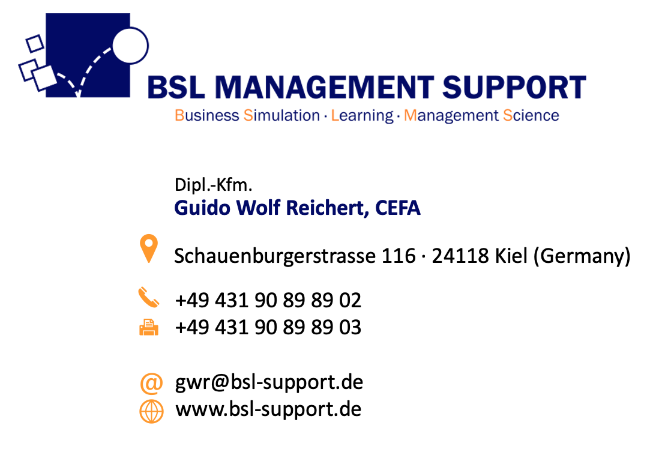BusinessSimulationDynamic modeling for business, economics, and ecology |
|
Package Contents
|
User's Guide to BusinessSimulation Library |
|
|
Setting important global variables within a model |
|
|
Example models showing basic and advanced functionality |
|
|
Agile system dynamics modeling with quantitative causal loop diagrams (CLD+) |
|
|
Containers ("reservoirs") used to represent entities that have been stored in a specific state |
|
|
Processes that move entities from one stock to another at a specific rate |
|
|
Flows into or out of a stock with infinite capacity at a system's boundary |
|
|
Information processing (blocks) |
|
|
External information input |
|
|
Pre-built components to model decision making, information processing, and subsystems in general |
|
|
Package with sensor components |
|
|
Connectors and partial models for Business Simulations |
|
|
Functions used within the library |
|
|
Mathematical and other constants |
|
|
Package of Types |
|
|
Typical quantities used in models |
|
|
Partial classes for icons |
Information
This information is part of the Business Simulation Library (BSL). Please support this work and ► donate.
The BUSINESS SIMULATION LIBRARY (BSL) supports modeling and simulation of dynamical systems in the social sciences and ecology. Following John Sterman [3], the term "Business Simulation" is used in a broad sense, as modeling in these domains is concerned with control, decision making, and management of resources.
The BSL adopts the widely recognized System Dynamics approach and modeling paradigm introduced by Jay W. Forrester [1], [2]. System dynamics provides a versatile, foundational modeling framework, ideally suited for modeling, simulating, and analyzing strategic business or public policy issues.
Unlike existing approaches, the BSL utilizes Modelica's acausal connectors to accurately model the flow of conserved quantities such as matter, energy, or information, as well as to represent instantaneous information signal flows through causal connections. Using pre-built components and hierarchical modeling, even complex models can be developed in a fast and reliable manner with the added benefits of embedded documentation and compact presentation. A comprehensive introduction to the BSL and cyber-physical modeling is available in a recent paper [28] by the principal author.
To get started with the library, consider exploring the following resources:
► Examples
For information regarding further support options, error reporting, and feature suggestions click here
The main repository for this library can be found at https://github.com/bslMS/BusinessSimulation.
A dedicated Wolfram System Modeler version can be obtained from System Modeler Modelica Library Store.
Principal Author and Support
Your Contribution is Needed
Join me in shaping the future of business strategy and analysis. The Business Simulation Library (BSL), available under the EUPL-1.2, offers cutting-edge tools for modeling and simulation, empowering professionals and academics alike. Your donation directly contributes to enhancing BSL’s capabilities, ensuring it remains a state-of-the-art resource available to all, free of charge.
Your support enables continuous improvement, from refining existing features to developing new ones, all while keeping BSL accessible. If BSL has been a valuable asset in your work or studies, please consider making a contribution via PayPal. Every donation, no matter the size, plays a crucial role in our journey towards advancing business simulation technologies.
Thank you for considering a donation.
Acknowledgements
I am greatly indebted to Wolfram Research, Inc. and Wolfram MathCore AB for their invaluable support and contributions to the Business Simulation Library. Their expertise and resources have played a crucial role in the development and success of this project. I extend my sincerest gratitude for their generosity and collaboration.
Releases
- Version 2.2.0 (2024-03-04)
- Version 2.1.1 (2023-05-02)
- Version 2.1.0 (2022-12-03)
- Version 2.0.0 (2021-12-06)
- Version 1.0.1 (2021-02-02)
- Version 1.0.0 (2020-11-29)
Starting with release v2.2.0, a dedicated Wolfram System Modeler version is published with the build identifier -wsm.
Copyright © 2020 Guido Wolf Reichert
Licensed unter the European Union Public Licence (EUPL), Version 1.2 or later (the "License")
You may not use this work except in compliance with the License. You may obtain a copy of the License at:
https://eur-lex.europa.eu/eli/dec_impl/2017/863/oj (the English text for EUPL-1.2 is included in the UsersGuide)
Unless required by applicable law or agreed to in writing, software distributed under the License is distributed on an "AS IS" basis, WITHOUT WARRANTIES OR CONDITIONS OF ANY KIND, either expressed or implied. See the License for the specific language governing permissions and limitations under the License.
Modelica© is a registered trademark of the Modelica Association.
The freely available Lato fonts family is used by library classes; for the best visual experience it is highly recommended to install this font on your computer, which is available for download from its official site or—in an earlier version—from the Google Fonts website.
